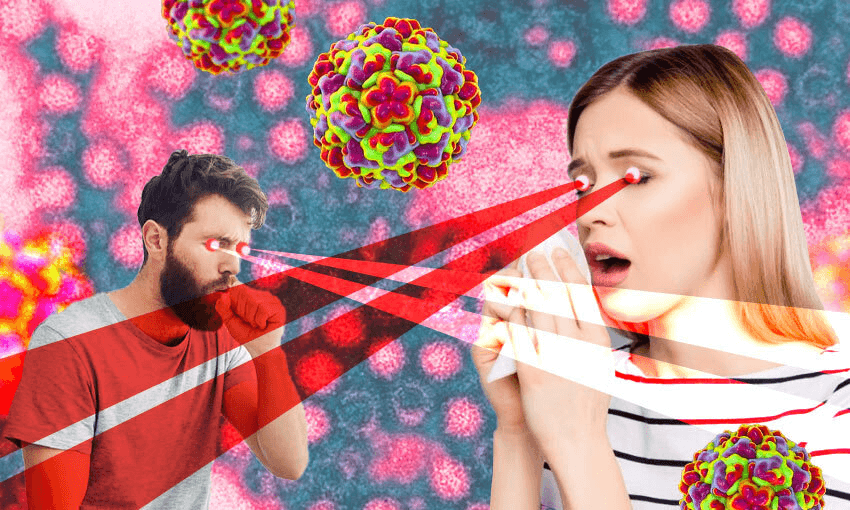The flu’s back, baby, and we’re more on edge about it than ever before. Here’s why you might sound like you’ve got Covid-19, even when you don’t.
It started with one guy, three weeks ago, sucking down Lemsip and declaring he had a “post-viral cough”. Now the air is filled with a cacophony of mucus, reminding us that contracting the lurgy is just one “post-viral” sneeze away.
We’ve made it halfway through winter without going into lockdown, and the flu is back at it again. Half the people at your workplace have a cough or a sniff. Some are taking sick days, some are working from home, and some are denying they’re sick at all.
Dr Lynn McBain, a GP and head of the Department of Primary Health and General Practice at the University of Otago, Wellington, says people with viruses are most infectious in the first three days of their illness – but they can still be infectious for longer.
“The common cold is infectious probably up to about a week,” she says. “The one that’s around a lot now is RSV – that’s been affecting a lot of young people. It’s most infectious in the first three days but could be up to eight or 10 days.”
She says some of these post-viral claims are correct – a cough can last for eight weeks after a virus has ended. “The infection itself does cause inflammation in the airways, and inflammation can continue after the actual infection has cleared,” she says. Hence the cough. But, she cautions, you can prolong that post-viral inflammation with poor throat care.
“The lungs become more sensitised, so it would take less to make someone cough after they’ve had an infection,” she says. “People who smoke or vape are putting irritants in their lungs every single inhalation, so they will be more likely to have an ongoing cough after infection.”
It’s not just the nicotine fiends who are out there perpetuating the wheezy nightmare: cold air, pollen, pine, fires, and post-nasal drip are all things that can set off a hacking fit if you’ve got a sensitive throat. McBain recommends trying to stay in a temperature-controlled environment, and using a nasal spray or rinse to dry up the drip down the back of your throat. Basically, a little discipline – an airway diet, if you will – can speed up a rough throat’s healing.
She says you can’t do any permanent damage by coughing – it’s a symptom, not a problem in itself. “Sometimes that ongoing cough is a sign there’s something in the lungs,” she says. “After two or three months, depending on the person, you do need as a doctor to think ‘hmm, I hope that smoker doesn’t have anything else going on’,” says McBain.
Going back to work after a virus is usually safe, but McBain says it’s important to acknowledge the changing times. “These days, when they first had the virus, hopefully they had a Covid-19 swab done,” she says. “Appropriately, people in workplaces are concerned.” A cough is one of the symptoms of the dreaded “long Covid”, so that’s something to bring up with a doctor if you’ve been unlucky enough to catch a bout of the number one public enemy.
So you’ve had your nasal swab, you’ve waited a cautious eight days, and you’re feeling fine – you just can’t stop barking. Should you go back to work? If you enjoy your cough, maybe a brisk walk from the winter morning air into a heated office is a good idea, yeah. If you work in some sort of dust factory, even better.
It’s not infectious, but to truly exorcise the ghost cough, the formerly ill (currently disturbing) should consider staying home and taking care of themselves a little more. And with 10 days of sick leave, that might be possible. If you’re all out of leave, no worries – the only harm these coughs are doing is shattering any moment of peace our seasonal-affective-disordered minds have managed to find.
Lemsip guy was not approached for comment as he is clearly still viral.

